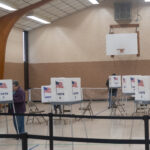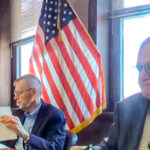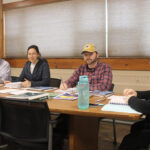Some of us love winter. Others not so much. For our ancestors winters could be brutal. Until the mid-20th century, a majority of Americans lived in rural areas, many on back roads. For them there were no town plows, sanding trucks, ambulances, phones or cars. Horses with sleds couldn’t fight their way through deep snow drifts. I remember snow drifts reaching the top of the barn roof when I was young, but the town plows kept the roads open. For farmers living back from a main road in 1900, for example, isolation in winter was a serious thing.
The COVID-19 pandemic has led to interruptions of socializing, but ancestors who farmed or ranched were totally isolated from other people, church, entertainment of any sort except self-created, or medical care. They had to be self-sufficient in a manner we can’t fathom. We rely on others and on communication methods our ancestors couldn’t have imagined.
Wood crews in wood camps were also isolated over the winter months. They weren’t alone, but many camps weren’t easily accessed from the outside world. If there was an accident there was often no help but each other. I have a great photo of one of my grandfathers taken while he was working in a wood camp. He certainly looks scruffy, in sad need of a haircut, shave and clean clothes. His camp mates are in the same state.
Both sets of my grandparents had only one way to reach a neighbor, doctor, get a needed supply, mail or learn the news. They had to strap on snowshoes and make the trek into town. The men wore woven pack baskets purchased from Native Americans on their backs, so they were limited in how much they could carry. If a rural ancestor was truly snowed in, then an accident or infection could mean death.
Schooling was also an issue. My mother and one of her brothers boarded in town so they could attend high school. In one storm they snowshoed home, worried about their mother alone with the youngest child while Grandpa was logging. Their mother’s delight and relief to see them spoke volumes.
Many children had to snowshoe or use a kick sled to reach a school by law no more than four miles round trip from their homes. In our neighborhood the one-room school was literally across the road, and sometimes the teacher boarded with my grandparents, which meant my aunts and uncles had no excuses about attending school. It could be harder for some of the other children in the neighborhood. The old joke about walking to school uphill both ways really happened in my area with foothills all around.
You probably have winter stories in your family’s past. Be sure to write them down. As we move into a world our forebears could hardly have dreamt of, we mustn’t lose touch with the past and these types of family history. Most of our ancestors had lives much harder than our own. Honor them.
Columnist Nancy Battick of Dover-Foxcroft has researched genealogy for over 30 years. She is past president of the Maine Genealogical Society, author of several genealogical articles and co-transcribed the Vital Records of Dover-Foxcroft. Nancy holds an MA in History from UM and lives in DF with her husband, Jack, another avid genealogist. Reader emails are welcome at nbattick@roadrunner.com.




